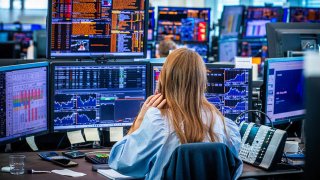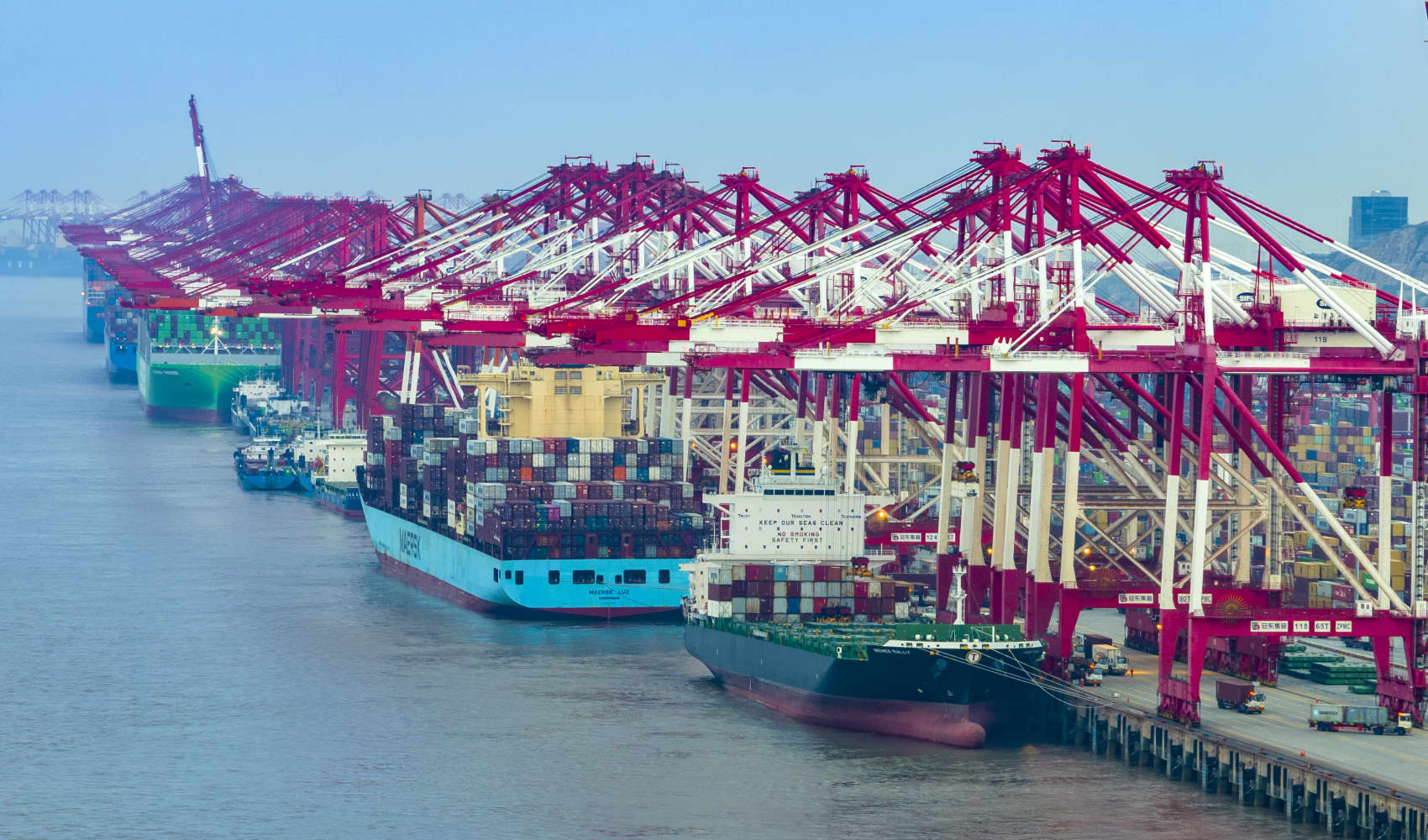
Employees in the trading room of Nordea Markets follow the turmoil and sharp stock market declines following the tariff war that is affecting markets worldwide, in Oslo, Norway, on April 7, 2025.
This was CNBC's live blog covering European markets.
European stocks sank for a fourth straight session on Monday, amid a global equity market rout that kicked off last week following the latest announcements of U.S. President Donald Trump's tariffs regime.
Watch NBC6 free wherever you are
The pan-European Stoxx 600 index fell up to 6% earlier in the session, but slightly pared losses to close 4.54% lower. France's CAC 40 tumbled 4.8% as Germany's DAX shed 4.26% and the U.K.'s FTSE 100 lost 4.4%.
U.S. stocks, which tanked toward the end of last week as the "Magnificent Seven" mega-cap tech stocks lost more than $1 trillion in a single day, were also sharply lower on Monday.
Get local news you need to know to start your day with NBC 6's News Headlines newsletter.
Global equity markets were rocked during the afternoon Europe session, briefly spiking into the green following a media report and social media speculation about a potential tariff pause. White House Press Secretary Karoline Leavitt told CNBC's Eamon Javers on Monday that any talk of a 90-day pause was "fake news."
Further uncertainty was delivered just before the European close, as Trump threatened to hike tariffs on China by another 50% unless it scraps retaliatory duties.
Read CNBC's live coverage of U.S. tariff policy here.
Money Report
Last week, the regional Stoxx 600 index notched an 8.4% loss, marking its worst week in five years. In the past decade, the Stoxx 600 only performed worse at the beginning the Covid-19 pandemic in 2020.
Trump announced his full list of so-called reciprocal tariffs, with investors surprised by the extent to which imports from key U.S. trading partners would be hit with new duties.
The move also sparked fears of a global trade war, with China retaliating by slapping 34% tariffs on U.S. goods and the EU vowing to impose countermeasures of its own if negotiations with America fail.
In Asia on Monday, stocks also continued to sell off, led by shares listed in China. Asian economies are set to be among those hit hardest by reciprocal tariffs, with Vietnam targeted by 46% duties, China with new 34% tariffs, while Cambodia has been hit with 49% tariffs and Sri Lanka with 44%. Many of the region's economies play key roles in international firms' supply chains.
Despite the market reaction, Trump has doubled down on his trade policies. On Sunday, the president told reporters that while he didn't want markets to go down, "sometimes you have to take medicine to fix something."
Europe stocks close at 14-month low
Europe's Stoxx 600 index provisionally ended the session 4.54% lower at 473.82 points on Monday, marking its lowest closing level since Jan. 23, 2024.
Utilities, retail, insurance, financial services, oil and gas and chemicals were among the sectors to each lose more than 5%.
— Jenni Reid
UK PM Starmer: U.S. economic deal talks continue despite tariffs
U.K. Prime Minister Keir Starmer said his administration is in talks with the U.S. over an economic deal, despite the "huge challenge" posed by tariffs.

"We will keep calm and fight for the best deal with the U.S., and we've been discussing that intensely over the last few days," he said.
"But we are also going to work with our key partners to reduce barriers to trade across the globe, to accelerate trade deals with the rest of the world, and champion the cause of free and open trade."
Starmer added that he would only strike a deal if it was in the national interest of the U.K.
He was speaking at the Jaguar Land Rover factory in Birmingham. The company on Sunday said it would pause U.S. shipments for a month as it assesses the impact of U.S. tariffs.
— Jenni Reid
'Fake news': White House dismisses report of Trump considering 90-day pause
The White House dismissed a wire headline that said Trump is considering pausing new tariffs for 90 days.
"Fake news," White House Press Secretary Karoline Leavitt told CNBC's Eamon Javers after a headline that cited Kevin Hassett, the director of the National Economic Council.
Trump himself posted on social media a video of Fox Business host Maria Bartiromo saying, "Rates are plummeting, oil prices are plummeting, deregulation is happening."
"President Trump is not going to bend," Bartiromo said in the video.
- Dan Mangan
Europe to start collecting tariffs on U.S. imports from April 15
The European Union plans to begin collecting the first tranche of tariffs on U.S. imports from April 15, according to the bloc's Trade Commissioner Maros Sefcovic.
Sefcovic said that the bloc will vote on a plan for countermeasures to Trump's widespread tariffs on April 9. He added that duties will start for the second set of measures on May 15.
The tariffs are in retaliation to Trump's imposition of tariffs on steel, aluminium, and autos and a 20% duty on other goods.
Sefcovic said the U.S. tariffs are impacting 380 billion euros worth of Europe's exports to the United States, amounting to around 70% of total exports.
"To put it in a perspective, over 80 billion euros in duties, an 11-fold jump from 7 billion euros the US currently collects from day one," he added.
The trade commissioner said Europe had offered zero for zero tariffs for cars and all industrial goods and that if both sides were willing to team up, there was the potential for a "truly transatlantic marketplace" that benefits Europe and the U.S.
— April Roach
U.S. stocks open lower Monday
U.S. stocks began Monday in the red, with the S&P 500 following the Nasdaq Composite to enter bear market territory.
The broad market index fell 3.5%. The Dow Jones Industrial Average slipped around 3.1%, while the tech-heavy Nasdaq Composite declined 3.7%.
— Hakyung Kim
Global bond yields mixed as investors assess state of play
A rally in global bonds as investors flock to safety eased Monday, as investors assess a flurry of news on stocks, tariffs, inflation and more.
The yield on the U.S. 10-year Treasury was 5 basis points higher at 2:32 p.m. U.K. time (9:32 a.m. ET), slightly rebounding from recent losses. The 2-year Treasury yield was down nearly 5 basis points.
In Germany, a gauge for the wider euro zone, the 2-year bund yield was 9 basis points lower while the 10-year bund yield dipped 3 basis points.
U.K. gilts were also mixed, with the 2-year flat and the 10-year higher by 7 basis points.
— Jenni Reid
EU to create import surveillance task force, diversify trade portfolio

Europe will establish a new import surveillance task force, as it looks to diversify its trade portfolio in the wake of Trump's sweeping tariffs.
"Further diversifying our trade relations is very critical for us, because this broadens the market opportunities and is crucial for our companies," European Commission President Ursula von der Leyen said at a press briefing.
"So we will focus like a laser beam on the 83% of global trade that is beyond the United States, vast opportunities, and this is why we're deepening our relations with our trading partners."
Von der Leyen mentioned existing deals with Mexico and Switzerland, and potential deals with India, Thailand, Malaysia and Indonesia.
Europe stands ready to respond to Trump's aggressive tariff agenda with counter measures if necessary, she said, but the region still stands "ready to negotiate" with the U.S. if possible.
— April Roach
Jamie Dimon says Trump tariffs will boost inflation, slow growth

JPMorgan Chase CEO Jamie Dimon said in his annual letter that Trump's tariffs will likely boost prices on both domestic and imported goods, weighing down a U.S. economy that had already been slowing. He is the first CEO of a major Wall Street bank to publicly address Trump's sweeping tariff policy as global markets crash.
"Whatever you think of the legitimate reasons for the newly announced tariffs – and, of course, there are some – or the long-term effect, good or bad, there are likely to be important short-term effects," Dimon said. "We are likely to see inflationary outcomes, not only on imported goods but on domestic prices, as input costs rise and demand increases on domestic products."
Dimon said whether tariffs will cause a recession remains in question, but they will undoubtedly slow down growth.
— Yun Li, Hugh Son
S&P 500 losses approaching Great Depression record
If the S&P 500 ends at least 4% Monday — which would mark its third straight day of a losses of 4% or greater — this would mark the first time since the Great Depression in 1933 it has notched such large back-to-back consecutive losses, according to the Carson Group's Ryan Detrick.
This would also be only the third time in history the broad market index has finished 4% or lower for three straight days, all of which were during the Great Depression.
— Hakyung Kim, Adrian van Hauwermeiren
German stocks plummet

Germany's DAX index was 6.1% lower at 10:13 a.m. in London, putting it on course for its biggest daily decline since the Covid-19 pandemic began in March 2020.
The country's MDAX index — home to 50 German mid-caps — was also on course for its worst trading day since 2020.
German-listed stocks suffering the biggest blows on Monday include defense giants Thyssenkrupp, Hensoldt and Rheinmetall, down 10.6%, 10.7% and 9.5%, respectively, as well as sports apparel giants Adidas and Puma, which shed 8% and 9%.
— Chloe Taylor
Volatility expectations rise
The European Stoxx 50 Volatility index was 51% higher at 9:53 a.m. in London, putting it on track for its best day in 10 years.
The index is designed to reflect expectations of near- and long-term volatility in European markets.
The German VDAX index — a gauge of the volatility outlook for German stocks — also edged toward its biggest daily gain in 10 years after jumping 35.2%.
— Chloe Taylor
Euro rallies as stocks sell off
The euro was 0.6% higher against the U.S. dollar on Monday morning.
Last week, the currency reached a six-month high.
— Chloe Taylor
European defense stocks fall sharply; Rheinmetall down 17%

Shares of German arms manufacturer Rheinmetall fell sharply on Monday morning.
Rheinmetall traded 17% lower at around 8:35 a.m. London time (3:35 a.m. ET), paring some of its losses after falling as much as 27% shortly after the open. The company had briefly been on track for its worst day on record, Reuters reported.
Shares of German defense giant Thyssenkrupp fell 10%, Swedish defense manufacturer Saab tumbled 7.3%, while trading was halted for Italy's Leonardo after a sharp fall.
It comes amid a broad and severe market sell-off following the announcement of U.S. President Donald Trump's sweeping tariff policy. Europe's defense giants, which have surged in recent months, were among those leading the losses.
— Sam Meredith
European markets tank at the open
European stocks dropped sharply after Monday's opening bell, as the fallout from U.S. President Donald Trump's so-called reciprocal tariffs continued.
The Stoxx 600 surpassed a 6% loss shortly after trading began, before pulling back slightly to a loss of around 5.9% by 8:26 a.m. in London. Germany's DAX index, home to some of the region's biggest companies, initially shed more than 10% before paring some of those losses to trade around 7% lower.
— Chloe Taylor
Oil giant Shell trims first-quarter LNG production outlook

British oil major Shell trimmed its first-quarter liquefied natural gas production outlook.
In a trading update published Monday, the London-listed company said LNG liquefication volumes would likely reach between 6.4 million and 6.8 million metric tons, down from a previous forecast of 6.6 million to 7.2 million tons.
Shell said first-quarter exploration well write-offs were expected to be around $100 million.
The energy major is scheduled to report first-quarter earnings on May 2.
— Sam Meredith






